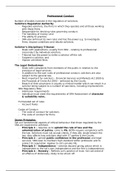Summary
Summary Professional Conduct - Workshops 1 & 2 - Detailed.
- Institution
- University Of Law (ULaw)
This documents covers both workshops. Workshop 2 is covered at the start of the document e.g. FSMA. These notes have been written in a style which provides an in-depth understanding of the module and have been created to be used in exams. There are questions and answers and plenty of different ...
[Show more]





